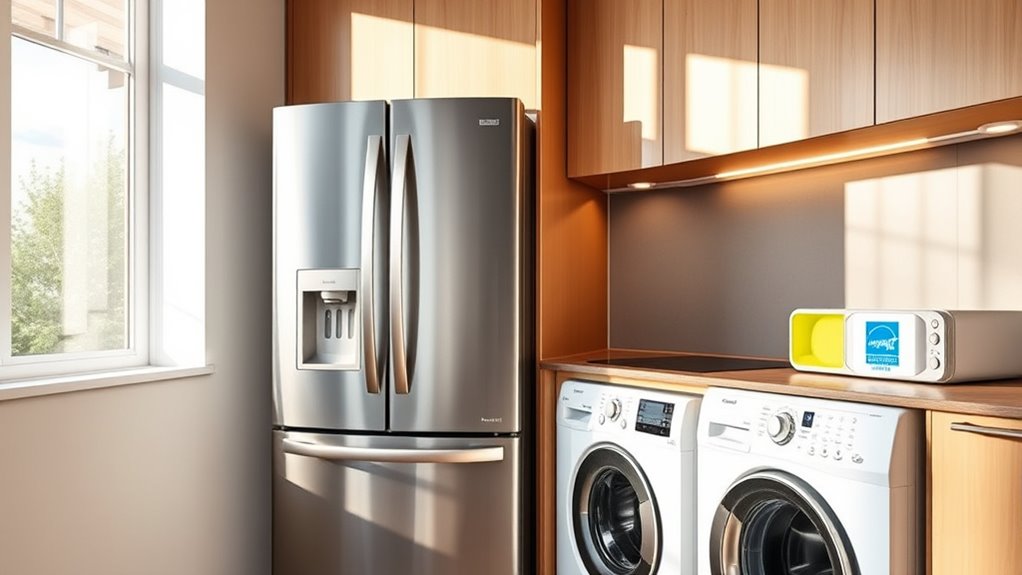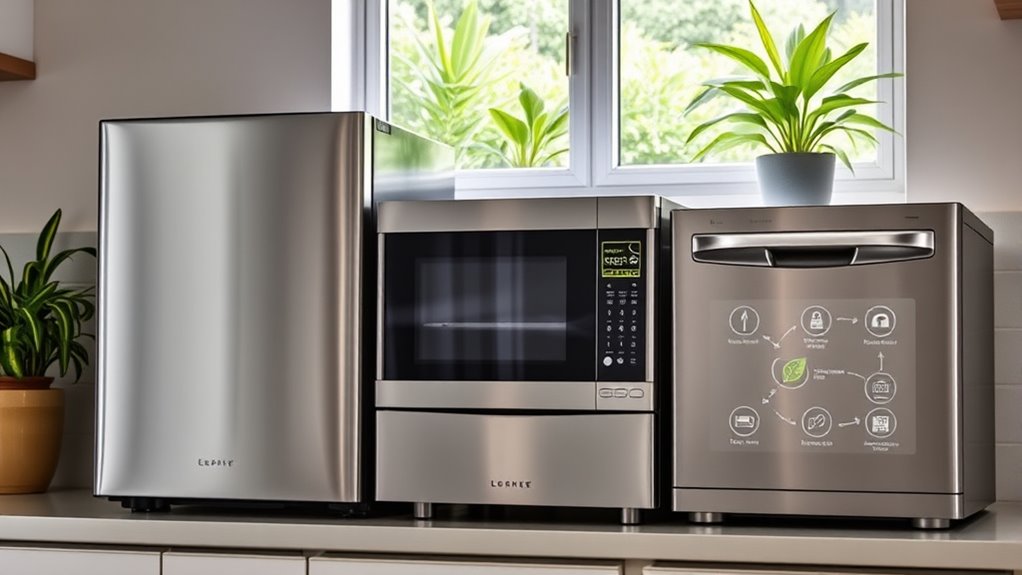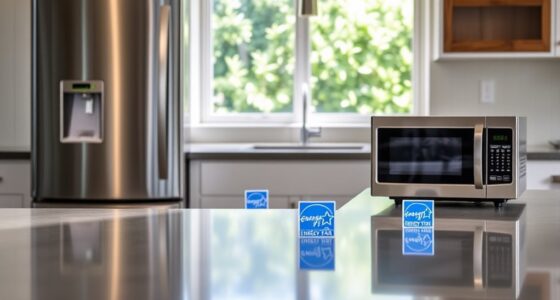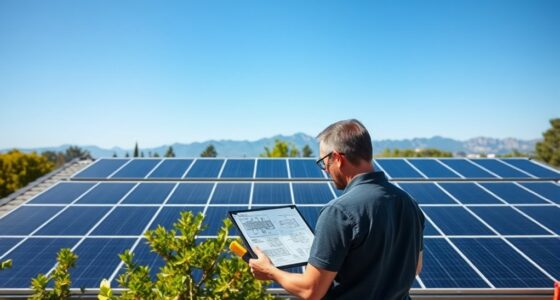When choosing energy-efficient appliances, look for the ENERGY STAR label, which signifies products meet strict efficiency standards from the EPA and DOE. These appliances consume less energy, saving you money and helping the environment. Check their ratings and data to compare long-term costs and performance. Items like refrigerators, TVs, and light bulbs with ENERGY STAR are a smart buy. Keep exploring to discover more tips for making eco-friendly choices.
Key Takeaways
- Check for ENERGY STAR certification to ensure appliances meet strict efficiency standards.
- Compare energy consumption data and ratings to identify the most cost-effective options.
- Look for appliances with high efficiency ratings, like ≥90% AFUE for furnaces.
- Prioritize models that reduce energy use in standby modes, such as low-watt TVs and LED bulbs.
- Consider long-term savings and environmental benefits from energy-efficient features and durability.

Are you looking for ways to cut your energy bills and reduce your environmental impact? Choosing energy-efficient appliances is one of the smartest steps you can take. To start, look for products with ENERGY STAR certification. These appliances meet strict efficiency criteria set by the EPA and DOE, ensuring they use less energy without sacrificing performance. For instance, ENERGY STAR refrigerators consume at least 15% less energy than federal minimum standards, saving you money over time. Certified TVs are designed to consume 3 watts or less in off mode—about half the energy of standard models—helping you cut standby power consumption. Light bulbs with ENERGY STAR labels, such as CFLs, use approximately two-thirds less energy than incandescent bulbs, offering longer-lasting illumination while reducing your electricity bills. Furnaces with the ENERGY STAR label must have a 90% AFUE rating or higher, making them roughly 15% more efficient than federal minimum standards. When shopping, compare efficiency ratings and energy consumption data to guarantee you’re choosing the most cost-effective option. Additionally, understanding creative practice can help you approach energy-saving strategies with innovative solutions and a mindset open to experimentation, leading to more effective and sustainable choices.
Frequently Asked Questions
How Do Energy-Efficient Appliances Impact Long-Term Electricity Bills?
Energy-efficient appliances markedly lower your long-term electricity bills by consuming less power over time. You’ll notice savings of around $450 annually, and potentially up to $8,750 in your appliance’s lifetime. They meet strict standards, often feature smart technology, and use detailed energy data to optimize performance. By choosing these appliances, you reduce energy costs, contribute to environmental health, and enjoy reliable performance, making your household more economical and eco-friendly in the long run.
Are Energy-Efficient Appliances Compatible With Smart Home Systems?
You’ll find that most energy-efficient appliances are compatible with smart home systems like Alexa, Google Home, and Apple HomeKit. They often integrate seamlessly, allowing you to control and automate them easily. Look for devices with smart features, automation options, and energy monitoring. Ensuring compatibility means your appliances work smoothly with your existing setup, helping you optimize energy use, save costs, and create a more efficient, connected home environment.
What Maintenance Is Required for Energy-Efficient Appliances?
They say “an ounce of prevention is worth a pound of cure,” and that’s true for your appliances. You should clean filters regularly, check seals for wear, and guarantee proper placement to maximize efficiency. Lubricate moving parts, tighten electrical connections, and follow manufacturer guidelines. Regular inspections help catch issues early, saving energy and prolonging your appliances’ lifespan. Proper maintenance keeps everything running smoothly and efficiently.
Do Energy-Efficient Appliances Perform as Well as Traditional Ones?
You might wonder if energy-efficient appliances perform as well as traditional ones. The good news is, modern technology has improved their performance markedly. You’ll find that these appliances often match or even surpass traditional models in efficiency and effectiveness. Plus, they do so while using less energy, which helps you save money and reduce your environmental impact. So, rest assured, energy-efficient options can deliver the same great results.
Are There Government Incentives for Purchasing Energy-Efficient Appliances?
You’ll find that there are government incentives available if you buy energy-efficient appliances. The federal government offers tax credits, like the Energy Efficient Home Improvement Credit, which can cover up to $3,200 for qualifying upgrades. Additionally, many states provide rebates for energy-efficient products, especially for low-income households. Just remember, you’ll need proper documentation, and starting in 2025, manufacturers must include a special code to support your claims.
Conclusion
Choosing energy-efficient appliances saves you money and reduces your environmental impact. For example, imagine upgrading your old refrigerator to an ENERGY STAR model; you’ll notice lower electricity bills and a smaller carbon footprint over time. By paying attention to energy ratings and features, you make smarter, sustainable choices. Investing in these appliances not only benefits your wallet but also contributes to a healthier planet. Start small today, and enjoy the long-term rewards.









